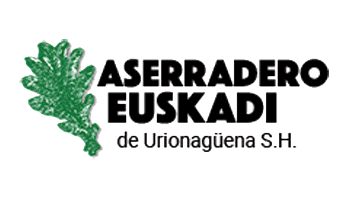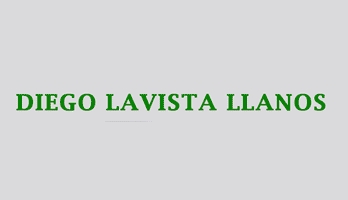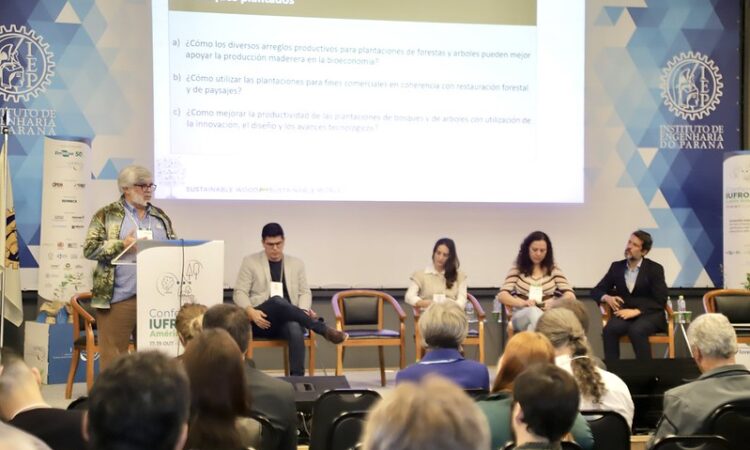
The challenge of sustainable forest management, scientific research and communication were central to the debate at the IUFRO 2023 Latin America Conference
The opening of the event was mediated by Martín Sánchez Acosta (INTA Concordia, Argentina), and was attended by members of the Organizing and Scientific Committee of the IUFRO Latin America conference, which highlighted the importance of diversified programming to reflect on sustainable management in forests. natives and forest plantations for wood production. The relevance of these spaces as an opportunity for networking and debates on the development of practices consistent with sustainability was also valued.
From October 17 to 19, the city of Curitiba hosted the IUFRO 2023 Latin America Conference, an event in which sustainable landscape management was debated: the role of forests, trees, agroforestry systems and their interactions with agriculture .
It was organized by the Brazilian Agricultural Research Company (Embrapa), through its Embrapa Florestas Unit, and the International Union of Forestry Research Organizations (IUFRO).
During these three days, experts from Latin America debated topics that were addressed from the analysis involving forests in global and regional contexts, to rural properties.
The Conference brought together different experts from the region, from public policy makers and scientists to the private sector and rural communities.
Six panels were organized that addressed:
• • Sustainable wood for a sustainable world (FAO/UN programme);
• • Forests planted with native and exotic species on rural property;
• • Sustainable forest management in micro-watersheds, including water flow regulation, ecological corridors and biodiversity indicators;
• • Sustainable forest mosaics in the landscape;
• • Management of natural forests, including secondary forests and forest restoration to promote the bioeconomy;
• • And integrated agricultural production systems, agroforestry systems and crop-livestock-forest integration.
In addition to the panels, they also presented 150 scientific works with research results on the topics proposed for the IUFRO 2023 Latin America Conference.
What is landscape management?
The landscape can be defined as a set of contiguous, spatially heterogeneous and interactive areas, where land cover (forests, for example) coexists with different land uses (agriculture, for example).
It encompasses rural and urban groups and its boundaries go beyond the properties and boundaries of conservation areas.
Typically, they are analyzed in the context of units such as river basins, at different spatial scales. A sustainable landscape is one in which the majority of ecological and productive processes are governed by precepts that lead to lasting quality and comply with environmental regulations and legislation.
Revaluing Forest Engineering
The opening speeches addressed the importance of the use and awareness of wood as a renewable and sustainable raw material.
The discussion of topics related to initiatives that seek to configure resilient landscapes for the benefit of communities and biodiversity, marked the beginning of the IUFRO 2023 Latin America Conference.
Mediated by Martín Sánchez Acosta (INTA, Argentina), the opening of the event was attended by the Organizing and Scientific Committee of the conference, which highlighted the importance of a diversified program to reflect on sustainable management in natural and planted forests, in addition to the relevance of meetings such as IUFRO 2023 as an opportunity for networking and debates on the development of practices consistent with sustainability.
The different uses of forests for wood production were the emerging themes of the opening ceremony, highlighted by Breno Campos, who represented the Secretary of Agriculture and Supply of Paraná, Norberto Ortigara, at the ceremony.
In the context of sustainable management, the importance of Forest Engineering was highlighted for the added value of raw materials in construction, furniture, among other products in which wood is used.
Territorial management in large landscapes or rural properties was discussed by the president of the Paraná Engineering Institute, José Carlos Dias Lopes, who explained the positive impact of territorial management for the conservation of biodiversity and, consequently, for better quality of life of the population. Dias Lopes took the opportunity to publicize the need to group rural and urban areas for environmental conservation in heterogeneous and interactive soils.
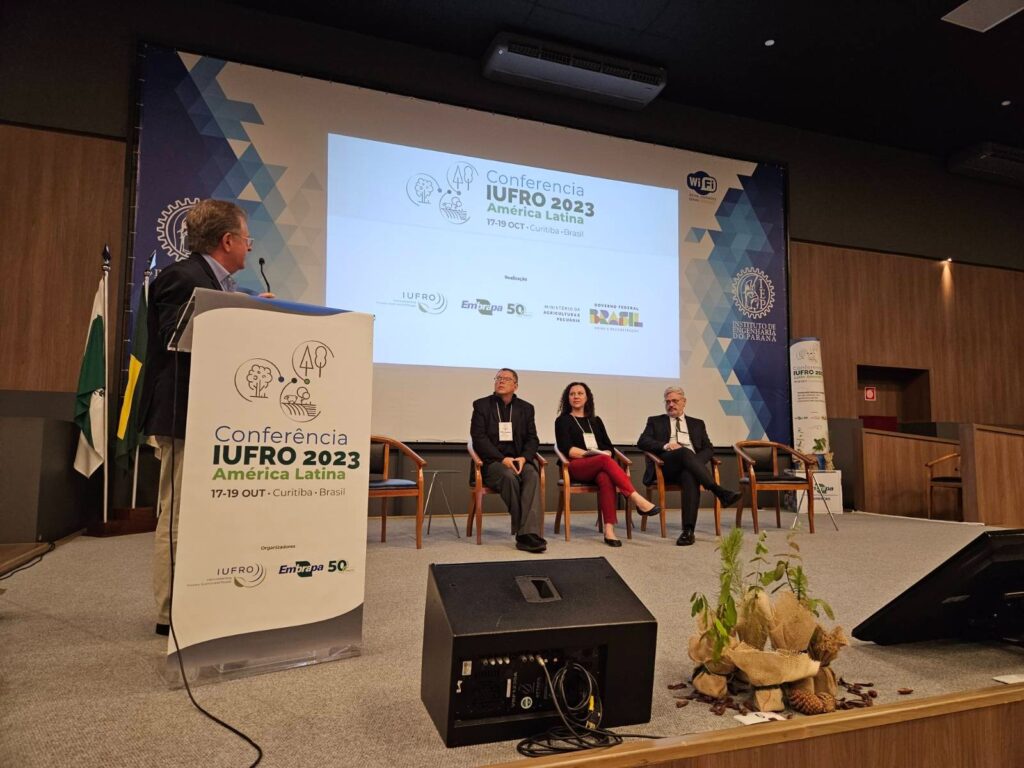
The challenge of achieving sustainably managed forests
Brazil plays an important role in decontaminating the environment through sustainable management, essential for biosafety, especially in relation to research with genetically modified organisms, highlighted by Erich Schaitza, general director of Embrapa Florestas, as an assertive technological alternative. to increase the productivity of natural and planted forests.
Forests, managed sustainably, become sources of energy generation, construction of wood products and economic growth, the result of national and international cooperation.
Genetic improvement, the planting of trees to neutralize carbon emissions, new uses of forests planted with renewable and sustainable raw materials and the need to create organized communication with society, were some of the topics considered urgent by those present. .
Allied to the Sustainable Development Goals (SDG), forests are essential to combat hunger, improve agriculture and responsible production, stated the administrative director of the Regional Council of Engineering and Agronomy of Paraná CREA – PR, Joao Groque.
The director highlighted the training of forestry engineers to solve technical problems of the landscape and minimize the impacts of industrial activity on the environment, in addition to obtaining economic resources collected within the licensing regulations.
Scientific research “is crucial”
The IUFRO 2023 Conference stood out for encouraging environmental progress, by proposing the exchange of ideas, participation in working groups and reflections on solutions that promote the well-being of humanity, as mentioned by Yeda Malheiros de Oliveira, researcher at Embrapa Florestas and president. of the event.
Oliveira also highlighted the extensive research carried out by Embrapa in relation to the benefits and impacts of and on forests, and the need to work together with scientific research, a thought also validated by the vice-rector of the UFPR, Graciela Bolzón de Muniz.
Both highlighted the need to build joint strategies between universities, public institutions, public and private productive sectors, which contribute to the growth of the country through a solid alliance.
At the opening of the Conference, the promotion of interrelations with other countries was also proposed, highlighted by the presence of international speakers and the participation of the Coordinator of the IUFRO Capacity Development Program, Janice Burns, who reaffirmed the importance of connection between forestry professionals, scientists and development policy makers.
Other topics were also addressed, such as technological development to promote environmental management, the close relationship between plantation, production, consumption and economy, and the importance of financial incentives from private companies and public organizations for the progress of the sector, highlighting the need of incentive taxes consistent with each mode of production, as is already a reality in other countries.
Communication, the forest weakness of the region
The general director of the Brazilian Forest Service, Garo Batmanian, raised a crucial point: the lack of information of the population about the use of wood, since a large part of society relates the felling of any tree with the problem of deforestation, but forestry production itself is carried out on technical bases and sustainable practices.
Raising awareness about these differences is important to change consumer habits and for the population to also act by demanding greater agility in the implementation of laws.
Finally, the ceremony also marked the delivery of an honorable mention from Embrapa Florestas to the Rede Mulher Florestal, for its work in favor of gender equality and equity, providing increasing alignment of the Brazilian forestry sector with the Sustainable Development Goals , especially SDG 5 (gender equality).
he IUFRO 2023 meeting was organized by Embrapa and the International Union of Forest Research Organizations (IUFRO), with the sponsorship of the Center for Wood Industries of the State of Mato Grosso (Cipem)/National Forum of Forest-Based Activities (FNBF) and Berneck.
It was also supported by the master's degree from the Araucária Foundation, Government of the State of Paraná, Capes and the Regional Council of Engineering and Agronomy of Paraná (CREA-PR); the Brazilian Forest Service, the Federal University of Goiás, the Federal University of Amazonas, the Federal University of Paraná, the State University of São Paulo Júlio de Mesquita Filho, the Federal Technological University of Paraná, Unicentro, the Paraná Engineering Institute, Society Brazilian Forestry Engineers, Klabin, Boulle Móveis, and sustainable and the need to create organized communication with society, were some of the topics considered urgent by those present.
Allied to the Sustainable Development Goals (SDG), forests are essential to combat hunger, improve agriculture and responsible production, stated the administrative director of the Regional Council of Engineering and Agronomy of Paraná CREA – PR, Joao Groque.
The director highlighted the training of forestry engineers to solve technical problems of the landscape and minimize the impacts of industrial activity on the environment, in addition to obtaining economic resources collected within the licensing regulations.
Scientific research “is crucial”
The IUFRO 2023 Conference stood out for encouraging environmental progress, by proposing the exchange of ideas, participation in working groups and reflections on solutions that promote the well-being of humanity, as mentioned by Yeda Malheiros de Oliveira, researcher at Embrapa Florestas and president. of the event.
Oliveira also highlighted the extensive research carried out by Embrapa in relation to the benefits and impacts of and on forests, and the need to work together with scientific research, a thought also validated by the vice-rector of the UFPR, Graciela Bolzón de Muniz.
Both highlighted the need to build joint strategies between universities, public institutions, public and private productive sectors, which contribute to the growth of the country through a solid alliance.
At the opening of the Conference, the promotion of interrelations with other countries was also proposed, highlighted by the presence of international speakers and the participation of the Coordinator of the IUFRO Capacity Development Program, Janice Burns, who reaffirmed the importance of connection between forestry professionals, scientists and development policy makers.
Other topics were also addressed, such as technological development to promote environmental management, the close relationship between plantation, production, consumption and economy, and the importance of financial incentives from private companies and public organizations for the progress of the sector, highlighting the need of incentive taxes consistent with each mode of production, as is already a reality in other countries.
Communication, the forest weakness of the region
The general director of the Brazilian Forest Service, Garo Batmanian, raised a crucial point: the lack of information of the population about the use of wood, since a large part of society relates the felling of any tree with the problem of deforestation, but forestry production itself is carried out on technical bases and sustainable practices.
Raising awareness about these differences is important to change consumer habits and for the population to also act by demanding greater agility in the implementation of laws.
Finally, the ceremony also marked the delivery of an honorable mention from Embrapa Florestas to the Rede Mulher Florestal, for its work in favor of gender equality and equity, providing increasing alignment of the Brazilian forestry sector with the Sustainable Development Goals , especially SDG 5 (gender equality).
he IUFRO 2023 meeting was organized by Embrapa and the International Union of Forest Research Organizations (IUFRO), with the sponsorship of the Center for Wood Industries of the State of Mato Grosso (Cipem)/National Forum of Forest-Based Activities (FNBF) and Berneck.
It was also supported by the master's degree from the Araucária Foundation, Government of the State of Paraná, Capes and the Regional Council of Engineering and Agronomy of Paraná (CREA-PR); the Brazilian Forest Service, the Federal University of Goiás, the Federal University of Amazonas, the Federal University of Paraná, the State University of São Paulo Júlio de Mesquita Filho, the Federal Technological University of Paraná, Unicentro, the Paraná Engineering Institute, Society Brazilian Forestry Engineers, Klabin, Boulle Móveis, the Municipal Institute of Tourism of Curitiba, the Curitiba City Council, Curitiba Visitors and Conventions Office.
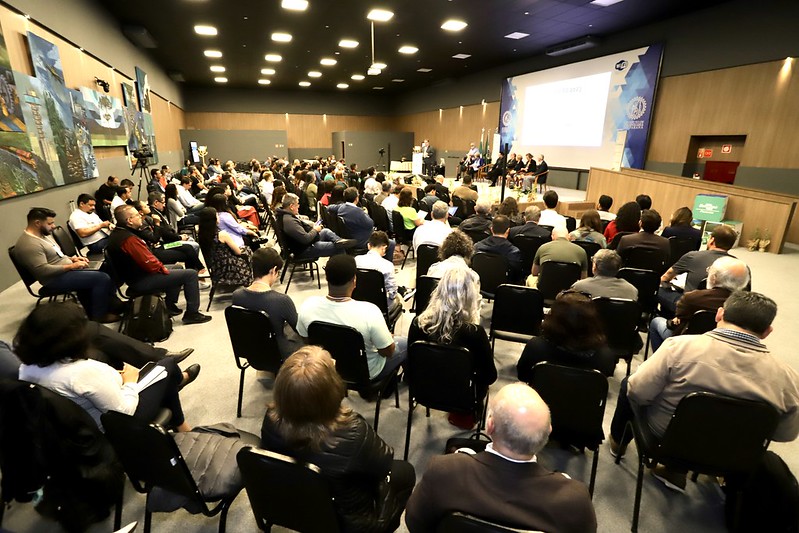

IT MAY INTEREST YOU
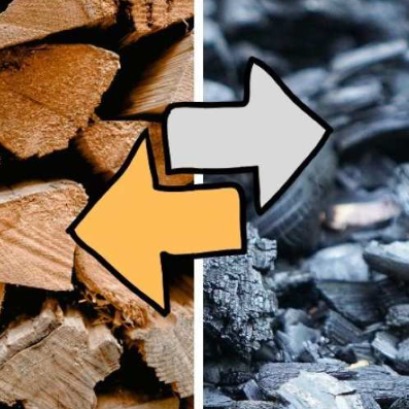 Canadian researchers make biochar from wood waste that rivals steel in strength
Canadian researchers make biochar from wood waste that rivals steel in strength
Researchers at the University of Toronto have developed monolithic biochar from wood that can reach an axial hardness of up to 2.25 GPa, similar to mild steel.
 Native forest | In Misiones, controls are tightened on routes for illegal transport of native wood, logging of forests without permits and fraudulent digital guides
Native forest | In Misiones, controls are tightened on routes for illegal transport of native wood, logging of forests without permits and fraudulent digital guides
Informality in forestry activity in Misiones was once again evident, the culture of operating illegally is a historical problem, and the Ministry of Ecology and Renewable Natural Resources carries out the corresponding control and inspection operations in the regulation of productive activity and sustainable management for the use of native forests.
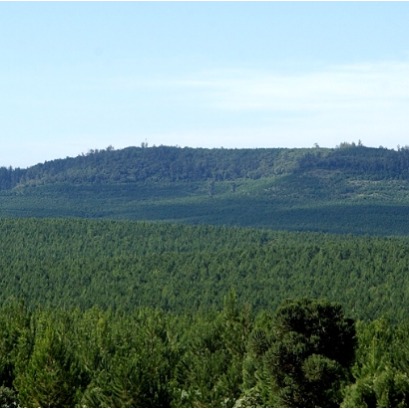 Free seminar on the implementation of the European EUDR regulation on deforestation-free wood products
Free seminar on the implementation of the European EUDR regulation on deforestation-free wood products
The Argentine Forestry Association (AFoA) organizes the seminar «EUDR in Forest Products: Current status of implementation. Regulatory requirements and private experiences", which will take place on Wednesday, November 26, from 11:00 a.m. to 12:00 p.m., via Zoom, with live streaming on YouTube. The European Regulation on Deforestation-Free Products (EUDR) will enter into force on December 31, 2025 and will impose new requirements for forest products entering the European Union market.










